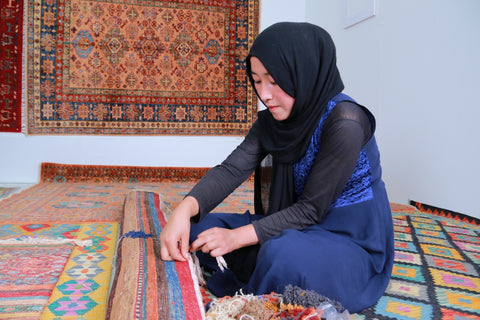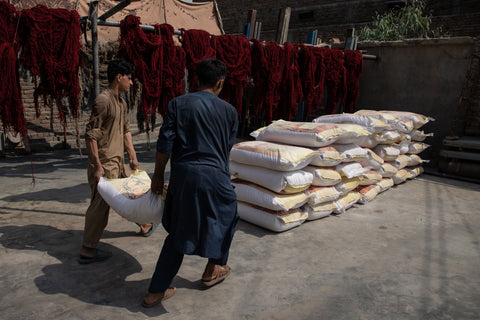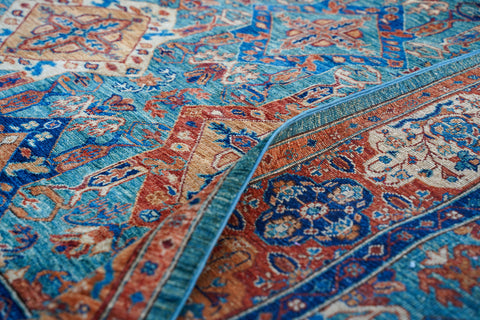
Welcome to The Rug Mine: A Beacon of Artisan Empowerment. Our passion for authentic Afghan craftsmanship drives our mission to support independent artisans — mostly remarkably talented women — who craft our luxurious rugs from the comfort of their own homes. Unlike employees, these artisans are free agents, choosing their collaborations freely and working under conditions they deem best for themselves. Our commitment to fair trade principles is entirely self-funded, underscoring our commitment to enhancing not only the livelihoods of these artisans but also the communities they support.
Challenging Cultural Norms and Valuing Craftsmanship. Despite the high quality of their work, artisanal rug-weaving remains one of the least valued professions in Afghanistan, a sentiment deeply ingrained in Afghan history. White collar professions like doctors, engineers, and lawyers are highly esteemed, while the arts, especially rug making, are not. This undervaluation is reflected in the market compensation for these artisans, which is among the lowest in the country. At The Rug Mine, we aim to challenge these cultural norms by elevating the status and economic standing of rug-weaving artisans through our fair trade practices.
A Personal Mission to Transform and Empower. As an Afghan woman who has firsthand witnessed the exploitative conditions of the handmade rug industry, I am driven by a commitment to effect change. Our fair trade initiative is a voluntary, ground-breaking effort to dismantle a cycle of exploitation and foster a culture of sustainable empowerment. We go beyond the norm, setting new milestones in fair trade practices in Afghanistan that are as unprecedented in their scope as they are in their impact.
Our Ethical Promise to Our Clients. Our clients enjoy not only the exceptional quality of our rugs but also the reassurance that each purchase contributes to a truly ethical and transformative business model—one that respects and uplifts the very artisans who create these beautiful rugs. At The Rug Mine, every rug tells a story of cultural heritage, ethical craftsmanship, and a brighter future for Afghan artisans.
Our Fair Trade Commitment Promise:
-
Empowering & Honoring Artisans with Shared Profits: At The Rug Mine, our dedication to our artisans extends beyond fair compensation. We honor the established market rates that Afghan artisans have traditionally charged, rates that have enabled them to make ends meet—albeit just barely. Recognizing the challenges they face, we pioneered a distinctive approach by sharing a percentage of our profits as bonuses on top of what they already earn. This initiative is not just about meeting market standards but about exceeding them and making a real difference in their lives.
These profit-sharing bonuses are meaningful—surpassing what some certified fair trade programs under global standards have managed to provide, according to assessments by entities like the World Bank. In a country without a minimum wage, determining what constitutes a livable wage is complex, so we stay continually informed about the cost of living in Afghanistan, monitoring essentials like food prices to ensure our bonuses meaningfully enhance our artisans' quality of life.
Moreover, we actively seek feedback from our artisans to validate that these bonuses truly make a significant impact. The gratitude and surprise expressed by our artisans upon receiving these bonuses have been profound, signaling a break from a longstanding industry norm where foreign companies seldom prioritize artisan welfare to this extent. This profit-sharing model is more than a business strategy—it is a historic, private enterprise-led initiative in Afghanistan that genuinely cares for and uplifts the communities it engages with. - Humanitarian aid: In addition to fair compensation, we provide support through annual humanitarian aid, enhancing the lives of our artisans and their communities.

- Child labor prevention: We partner exclusively with independent artisans committed to preventing child labor. By paying artisans fairly, we encourage support for education, allowing children to attend school instead of work.
- Empowerment and opportunity: Our focus is on the artisans — especially Afghan women — offering them the chance to weave our exquisite rugs from the comfort of their homes, fostering economic independence and personal growth.
- Preserving cultural heritage: Supporting our artisans helps keep the rich tradition of Afghan rug-making alive, ensuring their exceptional skills and craftsmanship are treasured and passed down through generations.

Quality Craftsmanship and Ethical Sourcing:
- Exceptional quality: Our commitment to fair trade practices result in higher quality rugs, as we work with the most seasoned artisans who take pride in their craft.
- Cruelty-free wool: We're committed to sourcing the highest quality wool from animals that are sheared cruelty-free, ensuring ethical and sustainable practices in every step of our rug-making process.

Why Choose The Rug Mine:
- Authentic craftsmanship: Our handmade Afghan rugs are lovingly crafted by skilled artisans using time-honored techniques, creating unique pieces that tell a captivating story.
- Win-win benefits: By purchasing a rug from The Rug Mine, you not only bring an exquisite piece of art into your home, but you also support the empowerment of the artisans' communities, the preservation of their cultural heritage, and our commitment to ethical practices—all without incurring extra costs.

The Journey of Our Vintage Rugs
While the rugs handcrafted by our partners in Afghanistan, brimming with story and craftsmanship, form the core of The Rug Mine collection, we also take great pride in offering a curated collection of vintage rugs. Unlike our new Afghan rugs, these vintage pieces don't follow the same sourcing journey or fall under our fair trade program – and for good reason.
Vintage rugs are enigmatic, each piece carrying with it a unique story and heritage that is often hard to unravel. Due to their age and the circumstances surrounding their creation, it's not always possible to determine who made the rug, what materials were used, or the exact conditions under which they were crafted. These rugs have traveled through time and are now with us, and while they may not be subject to our usual fair trade program, we do our utmost to ensure they originate from conditions respecting the same values.

In sourcing these vintage gems, I rely on my deep understanding of Afghan rug artistry, craftsmanship, and cultural significance. I evaluate their designs, the techniques used, and the materials, employing my best judgment to determine their origin and authenticity. This is a different process, but no less important or rigorous than our fair trade sourcing, because it ensures that we honor the integrity of these extraordinary pieces.
These vintage rugs, each unique in their history and design, form an important part of our collection. They offer something different – a slice of history, a testament to the evolution of Afghan rug weaving traditions, and an inherent, timeless beauty that only the passage of time can bestow. They carry a charm and character all their own, and when you bring one into your home, you're not just acquiring a rug, you're becoming a part of its story.
Please understand that while these vintage rugs aren't part of our fair trade program due to their inherent nature, The Rug Mine remains committed to promoting ethical practices, fair wages, and sustainable methods throughout our operations. Whether you're purchasing a newly woven Afghan rug or a vintage treasure, you're contributing to a larger story that values people, their craftsmanship, and their well-being.
Discover Our Collection:
Explore our beautiful assortment of handmade Afghan rugs with confidence, knowing that your purchase directly supports fair trade practices, sustainability, and the empowerment of our talented artisans—all while maintaining affordable prices. We're delighted to have you as part of our mission to create a brighter future for these remarkable artisans and their extraordinary craft.
Frequently Asked Questions (FAQs)
-
What is Fair Trade?
Fair trade is a trading partnership, based on dialogue, transparency, and respect, that seeks greater equity in international trade. It contributes to sustainable development by offering better trading conditions to, and securing the rights of, marginalized producers and workers. At The Rug Mine, we recognize that the concept of fair trade can vary significantly depending on the cultural and economic context. During our research into fair trade initiatives in Afghanistan, we found that for the majority of local artisans, 'fair trade' primarily means receiving fair compensation for their labor. This insight led us to implement a profit-sharing model where we supplement the market rates with a share of our own profits, directly enhancing the well-being of our artisans. We believe that understanding and honoring the artisans' perspective on what constitutes fair trade is crucial—more so than adhering strictly to definitions set by academic scholars or those removed from the day-to-day realities faced by the artisans themselves.
-
How does The Rug Mine implement fair trade practices?
The Rug Mine's fair trade commitment is uniquely self-funded and supports independent Afghan artisans by providing fair compensation well above the traditional market rates. Additionally, we share a percentage of our profits with the artisans as bonuses, ensuring they receive a livable wage that reflects the cost of living in Afghanistan. As a small California-based business, our commitment to ethical practices is unwavering, and we proudly sustain this initiative on our own. While fair trade certifications are a future goal, our dedication to doing what’s right drives everything we do. We are always looking to expand our impact and are actively seeking partnerships with like-minded organizations. If you are interested in partnering with us, please let us know. We also collaborate with fair trade partners in Afghanistan who help facilitate and oversee our program, ensuring transparency and effectiveness in all we do.
-
Are the artisans employed by The Rug Mine?
No, our partner artisans are not employees but independent professionals. As Afghans ourselves, we deeply value and respect this independence—a trait very much ingrained in Afghan culture. It's rare, though not unheard of, to see artisans employed directly by any business, as Afghans highly prize their autonomy. Our artisans have the freedom to select whom they work with and decline projects as they see fit. They operate their looms from the comfort of their own homes, taking on projects at their leisure and taking time off when necessary. This arrangement allows them to maintain full control over their work environment and hours, ensuring that their work complements their lifestyle and personal commitments, rather than dictating them. Notably, most artisans manage agricultural or other business enterprises alongside their artisanal craft.
-
How do you ensure the artisans are compensated fairly?
In the highly competitive rug-making industry, Afghan artisans have established their market rates to secure business and earn a livelihood. However, these rates are sometimes set out of necessity, influenced by competition with countries like India, Tibet, and Pakistan, where rug making is also prominent. Recognizing that these rates often do not provide adequate living standards, we at The Rug Mine have decided to share a portion of our profits with our artisans. This approach helps to elevate their standard of living beyond what the established market rates can offer.
Fair compensation, from our perspective, is closely tied to the economic conditions in Afghanistan—such as the cost of essential items like food, oil, wheat, and tea, which are staples in sustaining everyday life. We actively monitor these costs and adjust our payment structures accordingly. Moreover, we engage directly with our artisans to gather feedback on their financial needs and the adequacy of the compensation provided. This ongoing dialogue ensures that our support is both meaningful and responsive to their real-life conditions, without relying on a perfect formula but rather a commitment to genuine fairness and well-being.
-
What makes your fair trade commitment different from others?
Unlike many programs that depend on external funding, our fair trade initiative is completely financed through our own profits. This independence allows us to implement practices that are tailored specifically to the needs of our artisans and can be adjusted more flexibly and responsively. Leading our initiative is an Afghan woman, Nargis Habib, who grew up in Afghanistan, deeply understands the people and culture, and is committed to the betterment of her community rather than exploiting it for profit. Additionally, while The Rug Mine is a for-profit, purpose-driven business, we are dedicated to ensuring sustainability both in California, where we are based, and in Afghanistan. Our model strives to balance profitability with our fair trade goals, demonstrating that a business can thrive financially while actively supporting ethical and humanitarian objectives.
-
How do the profit-sharing bonuses work?
A percentage of sales at The Rug Mine are returned to the artisans as a bonus, on top of their contracted rates. These bonuses are carefully calibrated based on ongoing assessments of living expenses in Afghanistan, ensuring they provide meaningful support. In cases where rugs are produced in bulk by artisan communities who choose not to be individually identified—often those making flatwoven kilim rugs—we provide humanitarian assistance to these communities instead. Based on publicly-available World Bank data, our bonuses appear to match or exceed the rates that certified and government-funded fair trade organizations are paying artisans in Afghanistan. We consider this a significant feat.
As The Rug Mine evolves and grows more profitable, and as we forge partnerships with other organizations, we will gain even greater capacity to uplift these communities. This structured approach ensures that as our business thrives, so too do the artisans we work with, reinforcing our commitment to not only maintain but enhance our support as we progress.
-
What impact has your fair trade program had on the artisans?
Our program has significantly empowered artisans to earn compensation that enhance their ability to support their families, invest in their own businesses, and elevate their living conditions. Many artisans, particularly women, express that this model has instilled a sense of security and dignity that was often absent in traditional craft industries. Additionally, in the current political climate where many young women can no longer attend school or work, our fair trade program has provided an invaluable source of comfort and financial independence. This support not only fosters economic empowerment but also offers a vital lifeline, enabling these young women to continue contributing to their households and communities under restrictive conditions. The Rug Mine is committed to maintaining and expanding this impact, ensuring that our practices actively contribute to the well-being and resilience of the artisans we work with.
-
How can clients ensure they are buying a fair trade rug?
Clients purchasing from The Rug Mine can be confident that every rug is crafted with a commitment to fair trade conditions. We have established contracts with our artisan communities that mandate adherence to these fair trade standards. We enforce these standards rigorously to ensure that every product we sell meets our ethical and quality expectations. Artisans who are unable to comply with our standards will unfortunately lose our business, which includes access to bonuses and other benefits that we provide to support their welfare. Our commitment to these principles is deeply integrated into our business practices, and we strive to communicate the impacts of our fair trade commitment through detailed blogs and updates on our website. This transparency allows clients to understand and appreciate the integrity behind every purchase they make from The Rug Mine.
-
What are your future plans and initiatives at The Rug Mine?
At The Rug Mine, we are always looking forward, aiming to extend the support we provide to our artisans beyond just financial bonuses. A recent UN report highlighted that two-thirds of Afghan women suffer from conditions like depression, anxiety, and isolation—issues that we plan to address by integrating psychological services into our support offerings. Additionally, recognizing the physical toll that rug making can take, especially on eyesight, we aim to provide medical services, including ophthalmology, to help artisans maintain their health as they continue their meticulous work.
For the children of our artisans, especially young girls, we are exploring ways to empower them with educational opportunities. This includes providing laptops and possibly securing internet connections to help bridge the digital divide—maybe even with a little help from Elon Musk and some Starlink magic, if we can catch his attention!
These initiatives are just the beginning of what we hope will become a lasting legacy, transforming the lives of our artisans and their families for generations to come.
